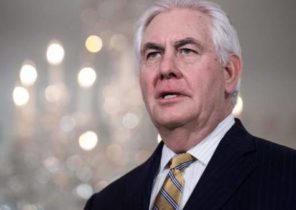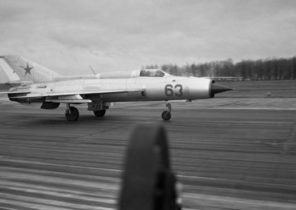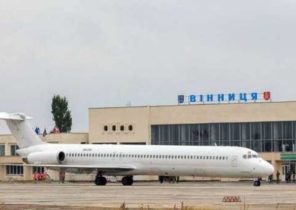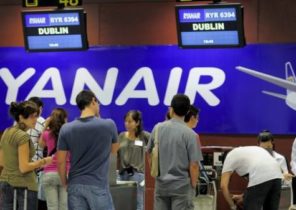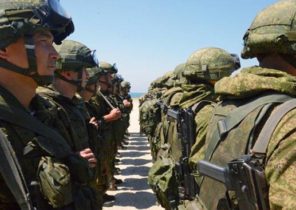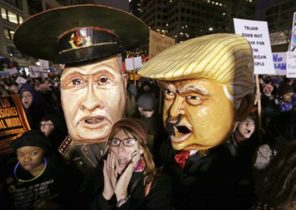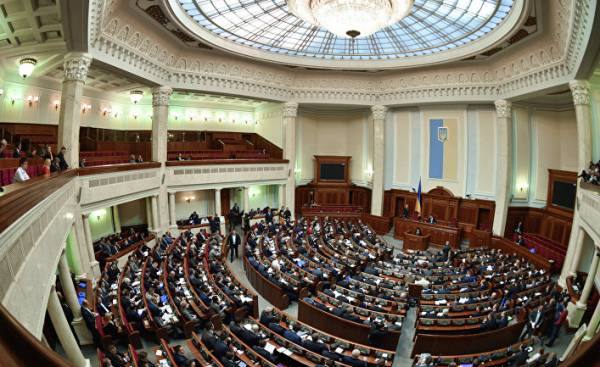
On the day following the granting Ukraine visa-free regime with the European Union group of MPs gathered at the Ukrainian Institute of the future, with independent experts to discuss the prospects of reintegration of the temporarily uncontrolled territories in Donbas.
The subject of hot discussion were three bills, and in fact three different approaches to solving the problems of the so-called “separate regions of Donetsk and Lugansk regions” (ORDA), controlled by Pro-Russian separatists and, according to the Ukrainian General staff, tens of thousands of regular soldiers of the Russian Federation.
The bill of the opposition faction “Self-help”, which at the beginning of the year supported the civil blockade ORDO, proposes to establish the state border regime on the demarcation line. According to one of the authors, Yegor Sobolev, this will help to avoid tragedies like the one that occurred in Odessa, where in may 2014 from the Crimea came the Russian saboteurs and provoked clashes.
“We believe that restrictions on certain rights of citizens living in the occupied territories, is the legal decision. Since we are talking about the preservation of the state, the rights of citizens to life,” explains the motives of the authors of the law Sobolev.
Second, the law places the responsibility for the condition of rights and freedoms in Russia as an occupier country. Sobolev is convinced that “the heavier the economic burden of the occupied territories to Russia, the sooner the Ukrainian land back under the jurisdiction of Ukraine.”
It is noteworthy that the first alternative bill introduced by another representative of the “Samopomich” Natalia Veselova. She is a native of Slavyansk, Donetsk region and founder of the charity Fund of the volunteer battalion “Donbass”. Veselov suggested distinguishing the occupied territories: “This is important because in Crimea, Russia makes no secret of the fact that there are its forces, its laws apply, there make the citizens of Ukraine to take Russian citizenship. While in the Donbass, Moscow denies that its troops are there and the administration, but argues that there emerged the self-proclaimed state. That is, there is the indirect occupation”.
Natalia Veselov considers the territory of Donbass “temporarily not due to the actions of terrorist groups receiving support from outside,” and categorically opposed to the regime of the state border. “We have not a civil war, and armed aggression by Russia, and in the occupied territories inhabited by citizens of Ukraine. If there are strong ties on the humanitarian level, it allows you to maintain a layer of loyal population and to prepare the reintegration of the territories,” — explains his logic Veselov. In addition, it indicates that any blockade ORDA will lead to Ukraine’s loss of influence on the mood of the citizens. Veselova also doubt that the adoption of any law will help to attract Russia to account for aggression. In her opinion, “only after the international community recognizes Russia’s aggression, Ukraine will be able to start the legal registration of the status of the occupied territories”.
The third alternative offers the independent MP, formally included in the presidential party, a former journalist Mustafa Nayem. He insists that “from the point of view of Ukraine, the Crimea and the Donbass are equally available, equally occupied by Russia”. Therefore, Ukraine should recognize the same rights for their citizens in the Crimea and in ORDA in accordance with international law. Nye draws attention to the fact that his bill creates a legal framework for gathering evidence about human rights violations and preparing lawsuits against Russia in international courts. “However, we hold Russia responsible for the violation of and interference with the rights of citizens of Ukraine,” says Nye. Otherwise, warns MP, citizens from the occupied territories will sue Ukraine.
The situation in the Donbass creates certain risks for Ukraine, says the lawyer of the human rights group Global Rights Compliance Anna Mykytenko. As an example, she cites the cases against Moldova: “we Need to remember that international obligations of Ukraine concerning the population of the occupied territories is not going away. And we need to prove that Ukraine has made every effort to ensure the rights of its citizens. The expert referred to the decisions of the ECHR in the “case of Ilascu” and “Moser”, in which the citizens of Moldova were judged against their country. Despite the fact that Transnistria was occupied, Moldova had to do everything for accessibility of public services”.
It should be noted that in all the proposed bills has weaknesses. First and foremost, is the commencement date of the occupation of the Crimea and parts of Donetsk and Lugansk regions. For example, the bill “Self-help” suggests that the Crimea has been occupied since February 26, 2014 (referring to the seizure of the building of the Crimean Parliament), Donetsk region — from April 7 (when was proclaimed the so-called DPR) and Luhansk — from 27 April (day of the proclamation of the LC). Mustafa Nayem and Natalia Veselovskaya equally determine the start date of the occupation of Crimea on 20 February. In this case, both authors are obviously referring to the data of Russian mass media about the official award of the Ministry of defense of the Russian Federation “For the return of the Crimea” (20.02.2014 -18.03.2014). But as the DNI and the LC, Nye offers start counting occupation of Donbass with April 7, and Veselov give the right to make this decision the Cabinet of Ministers.
If to speak about Crimea, then offer “Self-help” looks more reasonable, especially considering the explicit recognition of Vladimir Putin about the decision to use special forces of General staff of the armed forces “to protect the Russian people and the whole country”, 22-23 Feb.
In respect of Donbass, the situation looks more complicated from a political and legal point of view. If you take the beginning of the occupation from April 2014, then Ukrainian MPs indirectly recognize the actions of certain groups of citizens who seized the building of state administration in Donetsk and the SBU building in Lugansk, as the expression of the will of a neighboring state. At the same time, in contrast to the Crimea, the Russian government until September 2014 to officially not demonstrated the support of those who ventured into the self-proclaimed new “States”, and have consistently said about the internal crisis in Ukraine. From this point of view, Ukraine has not much of a chance to associate the appearance of the DNI and LC with the will and actions of the Russian authorities.
Another thing, the direct participation of Russia in the beginning of the so-called negotiations in the “Minsk format”. As pointed out by the experts of the Ukrainian National Institute for strategic studies (NISS) in the special English of the monograph The World of Hybrid War: Ukrainian Forefront, with the participation of Russian representatives in the work of the trilateral contact group on 5 September 2014 was signed the Minsk Protocol, which led to the cessation of active hostilities in the Donbas after Ilovaisky boiler. As a result, the demarcation line became an independent OSCE observers, who starting from September 2014 in their reports have documented numerous facts pointing to the lack of effective control over the occupied territories by the Ukrainian authorities.
Despite these problematic aspects of the laws on occupied territories, legislative support of state policy in respect of the employed Russia’s Donbass it is necessary to counter the attempts by the new US administration to resume cooperation with Vladimir Putin at the expense of Ukrainian interests.
In recent times Kiev has received alarming signals from Washington. For example, the new U.S. Secretary of state Rex Tillerson during a hearing in the House of representatives said that America should not “chain” itself to the Minsk agreement, if suddenly Kiev and Moscow will find a way out of conflict. Although the Minsk agreement are not ideal, they suggest, Russia’s actions to de-escalate the conflict, including active assistance in the removal of heavy weapons and the transfer of Ukrainian control over the state border in Donbas. If Russia was not a party to the conflict and did not exercise effective control over the separatists, it could so earnestly and confidently “sell” their services “peacemaker” in the West.
Ukraine is not objectively able to compete with Russia for influence and power in the international arena. Moreover, Russia constantly talks in “Norman format” puts pressure on Kiev, Berlin and Paris in order to impose their vision of ending the war. To avoid unacceptable conditions of reconciliation with the aggressor, Ukraine is preparing to legislate the boundaries of the possible compromise in a special law. It is significant that the President of Ukraine Petro Poroshenko on the eve of talks with new US leadership announced the preparation of the law on the reintegration of Donbass.
The basis of such a law, which, according to media reports, is being prepared by the Council of national security and defense, will be the development of NISI, based on the results of the analysis of the effects of the blockade of the Donbas in February and March of this year. Unlike the deputies, experts suggest to combine the steps for the specific support of the citizens of the occupied territories (pensions, financial assistance to displaced persons, youth work) with active opposition to Russian influence, for example, by introduction of a visa regime and restrictions of Russian capital in the economy. By the way, the NSDC Secretary Oleksandr Turchynov already predicted before Parliament the question of the visa regime.
It seems that the Ukrainian authorities decided to test the reaction of public opinion and international partners on certain provisions of the law before submitting it to the Verkhovna Rada. If the reaction in General will be positive or neutral, the law will try to take until October, in time for new negotiations in “Norman format”.
